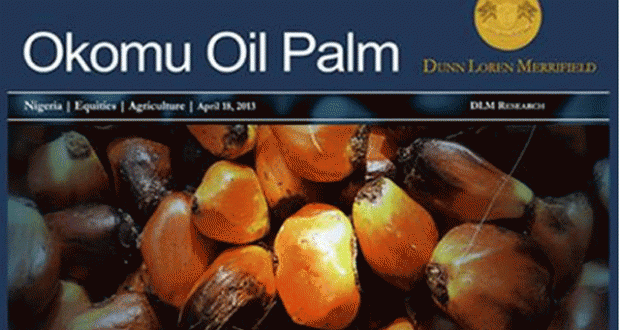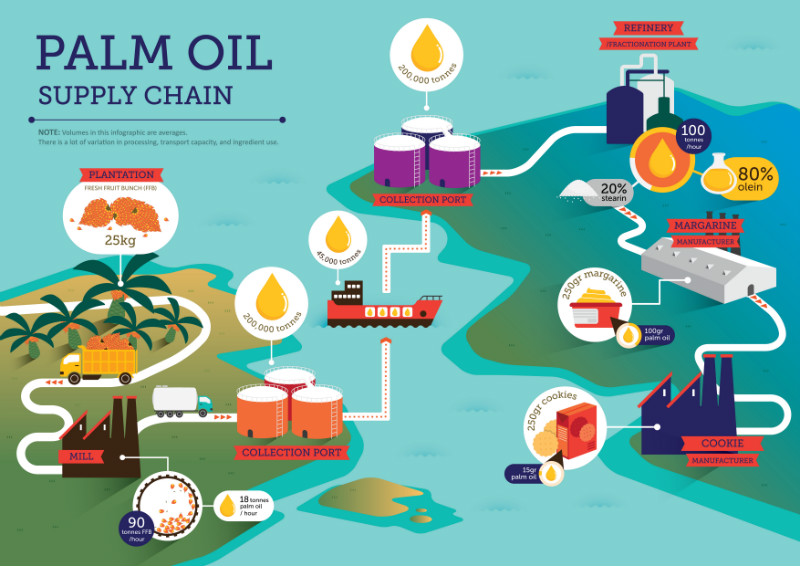Economy
Group Accuses Okomu Oil of Using Fake RSPO Certification

By Dipo Olowookere
Nigeria-based company engaged in processing of oil palm, Okomu Oil Plc, has been accused of deceiving members of the public by falsely saying it has the Roundtable on Sustainable Palm Oil (RSPO) certificate.
RSPO certification is an assurance to the customer that the standard of palm oil production is sustainable.
Palm oil producers are certified through strict verification of the production process to the stringent RSPO Principles and Criteria for Sustainable Palm Oil Production by accredited Certifying Bodies, and can be withdrawn at any time in case of infringement of the rules and standards.
At a press briefing in Benin City, Edo State on Tuesday, a group known as the Environmental Rights Action/Friends of the Earth (ERA/FOEN) alleged that Okomu Oil Plc has not met the RSPO requirements and asked the firm to stop parading the certificate.
“Okomu Oil Plc, RSPO certification is a false solution because it does not address environmental and socio problems in a community. The oil firm should stop parading itself as having RSPO certified compliance.
“They are not meeting RSPO guidelines and standards yet they continued to enjoy the advertisement and putting this logo on their signpost. We called on them to remove the RSPO certification from their narrative forthwith,” the group told newsmen at the briefing.
According to the Executive Director of ERA/FOEN, Mr Godwin Uyi Ojo, who addressed the media, Okomu Oil Plc is not amongst the over 3,500 companies, who are worldwide members of RSPO.
He explained that the palm oil giant was not certified by RSPO, but pointed out that its mainstream shareholder firm, Socfin, which controls its major shares, is an RSPO member.
Recall that Okomu Oil Plc and other investors in the palm oil industry in the state last April presented and launched the Nigeria National Interpretation of Round table on Sustainable Palm Oil (RSPO) to the public in Benin-City.
The communities are located in Ovia South-West, Ovia North-East, Uhunmwode and Owan West local government areas.
“On Socfin’s website there are some certifications Okomu Plc has in Nigeria, but are not directly linked to RSPO certification, covering its acclaimed 36,000 hectares plantation. Okomu Plc is not known to have formally applied to be a member.
“Okomu Oil Plc has no RSPO certification. Still, it publicly claims to uphold RSPO certification procedures in its operations, whereas this does not amount to direct RSPO membership. It does not also suggest the certification of its plantations and socio-economic gauges. Evidently, the company was part of RSPO meeting. The company is not certified by the RSPO.
“Okomu Oil palm company Plc asserts to have been given some certification in the category of International Organization for Standardization (ISO), through a bureau Veritas. Nevertheless, Okomu Plc’s certification status with the main Roundtable on Sustainable Palm Oil (RSPO), is vague, but the company is hesitant declaring its true standing,” he informed journalists.
Mr Ojo noted that the RSPO categorically state that there shall be no deforestation in areas of oil palm, whether new or expanding plantation, stressing that from Odiguette community in Ovia North-East, Igbobazuwa, Okomu communities in Ovia South-West to Sabo-Gida community in Owan West and Uhunmwode local government deforestation has taken massively.
He maintained that with the continued deforestation, Okomu Oil Plc cannot parade itself as having RSPO certificate.
He further admonished Okomu Oil Plc to stop all forms of oil palm plantation expansion that are detrimental to community farmlands, biodiversity hotspots and historical sites, settle all outstanding cases of compensation arising from destroyed crops and farmlands, halt environmental and rights violations and evictions of communities in its areas of operation and halt using any form of armed military personnel to molest and intimidate the people among.
Meanwhile, efforts by Business Post to reach out to the management of Okomu Oil Plc proved abortive as at the time of filing this report.
However, we promise to intensify our efforts to reach the company to have their reaction to this issue.
Economy
CBN Reduces Interest Rate by 50 Basis Points to 26.50%

By Adedapo Adesanya
The Central Bank of Nigeria (CBN) has cut the interest rate by 50 basis points to 26.50 per cent from 27 per cent.
Nigeria’s apex bank announced this during its two-day 304th Monetary Policy Committee (MPC) meeting, which concluded on Tuesday in Abuja.
This comes after the country’s interest rate cooled in January to 15.10 per cent from 15.15 per cent, according to the National Bureau of Statistics (NBS), strengthening the case for a reduction.
The CBN Governor, Mr Yemi Cardoso, said all members of the MPC unanimously agreed upon the decision.
“The committee decided to reduce the monetary policy rate by 50 basis points to 26.50 per cent,” he said.
Mr Cardoso stated that the liquidity ratio was maintained at 30 per cent, and the standing facilities corridor was adjusted to +50 to -450 basis points around the monetary policy rate.
He said the committee retained the Cash Reserve Ratio (CRR) at 45 per cent for commercial banks and 16 per cent for merchant banks, while the 75 per cent CRR on non-TSA public sector deposits was equally maintained.
The CBN uses the MPR, which works as the benchmark interest rate, to manage inflation, macroeconomic stability, and liquidity.
Last November, the MPC retained the Monetary Policy Rate (MPR) at 27.00 per cent. The last time the apex bank cut interest rates was in September last year, to 27 per cent from 27.50 per cent after a series of easing in inflation.
Market analysts had argued for higher interest cuts due to results seen in the CBN’s inflation targeting framework. Meanwhile, some say the 50 basis points reduction will offer a temporary reprieve as inflation heads for a single-digit target in the coming months.
Economy
Grey to Cut Cross-Border Payment Costs with New USD Offering

By Adedapo Adesanya
A cross-border payments solutions company, Grey has expanded its business banking platform to include US Dollar corporate accounts, bulk international payments, and USDC stablecoin support, all integrated into a single system.
The company is positioning itself as a low-cost, faster alternative to traditional international banking, particularly for businesses in emerging markets as it enables companies to open US Dollar accounts, receive global payments, and send payouts to 170+ countries, including bulk transfers, within minutes.
Grey aims to solve common cross-border payment challenges, particularly the high transfer costs that often range between 6 and 7 per cent of transaction value, prolonged settlement cycles that can stretch across several days, and the limited access many businesses face when trying to open and operate foreign currency accounts. In addition, companies frequently contend with hidden intermediary fees and poor foreign exchange transparency, both of which undermine cost predictability and effective cash flow management.
By integrating USD business accounts and USDC stablecoin functionality into its platform, Grey enhances its value proposition around faster settlement, clearer pricing structures, improved cost efficiency, and broader global accessibility. The expanded capabilities enable businesses to manage international transactions with greater speed, transparency, and operational control.
“Businesses may operate without borders today, but access to reliable global banking remains uneven, particularly for companies in high-growth markets,” said Mr Idorenyin Obong, Co-founder and Chief Executive Officer of Grey. “We’re closing that gap and enabling businesses to move money faster, with greater transparency and control, wherever their clients or partners are based.”
“When payments are delayed, or costs are unpredictable, growth stalls,” added Mr Joseph Femi Aghedo, Chief Operating Officer and Co-founder of Grey. “Grey eliminates those friction points, giving businesses a faster, simpler way to manage payroll, supplier payments, and partner payouts across borders. Adding USD and stablecoin capabilities makes these benefits accessible to even more customers.”
Established in Africa in 2020, Grey has a presence in key markets, including the United States, the United Kingdom, and Europe, and has recently expanded its services and operations into Latin America and Southeast Asia.
Since its inception, the company has consistently enhanced its services to empower digital nomads worldwide, regardless of location. Grey’s offerings include multi-currency accounts, low-cost international money transfers, a virtual USD card, expense management tools, and robust security measures.
Economy
Quidax, Lisk to Unlock Stablecoins, On-chain Financial Opportunities

By Aduragbemi Omiyale
A partnership designed to expand access to stablecoins and on-chain financial opportunities for everyday users and businesses has been entered into between Quidax and Lisk.
The partnership provides a critical gateway for the developer community, as builders on the Lisk network can now leverage Quidax’s robust digital asset infrastructure to access stablecoins and local currencies at competitive rates.
This institutional-grade infrastructure is designed to power “future-forward” financial products, ranging from neobanks and cross-border payment platforms to regional exchanges and global fintech solutions. It will also allow Quidax customers to trade and move value seamlessly using USDT, USDC, LSK, and Ether (ETH) on the Lisk network.
The collaboration will also accelerate the adoption of Web3 solutions that solve real-world financial challenges for millions of customers across Africa by combining Quidax’s deep local liquidity and compliant framework with Lisk’s scalable L2 technology.
In 2024, Quidax became the first crypto exchange to receive a provisional operating license from Nigeria’s Securities and Exchange Commission (SEC).
“The partnership with Lisk enables us to extend our platform to serve more people and cater to the increasing demand from products and services that want to integrate our stablecoin and digital assets product to build products across Africa,” the Chief Infrastructure Officer at Quidax, Mr Morris Ebieroma, said.
Also commenting, the Ecosystem Lead for Africa at Lisk, Ms Chidubem Emelumadu, said, “Africa represents one of the most critical frontiers for blockchain innovation, where the demand for reliable and inclusive financial tools is urgent.
“Our partnership with Quidax expands access to stablecoins and on-chain financial opportunities for everyday users and businesses. At the same time, it gives founders building on Lisk the critical infrastructure they need to create solutions that can scale meaningfully across the continent,” she added.
-

 Feature/OPED6 years ago
Feature/OPED6 years agoDavos was Different this year
-
Travel/Tourism10 years ago
Lagos Seals Western Lodge Hotel In Ikorodu
-

 Showbiz3 years ago
Showbiz3 years agoEstranged Lover Releases Videos of Empress Njamah Bathing
-

 Banking8 years ago
Banking8 years agoSort Codes of GTBank Branches in Nigeria
-

 Economy3 years ago
Economy3 years agoSubsidy Removal: CNG at N130 Per Litre Cheaper Than Petrol—IPMAN
-

 Banking3 years ago
Banking3 years agoSort Codes of UBA Branches in Nigeria
-

 Banking3 years ago
Banking3 years agoFirst Bank Announces Planned Downtime
-

 Sports3 years ago
Sports3 years agoHighest Paid Nigerian Footballer – How Much Do Nigerian Footballers Earn















